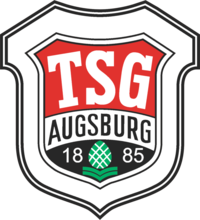|
TSG Augsburg
The TSG Augsburg is a German football and sports club from Augsburg, Swabia, formed in 1885. It consists of over 2,500 members in 13 different departments ranging from football to alpine skiing. OverviewThe club was formed on 12 March 1885[1] at the Gasthaus Paradiesgarten, a restaurant and pub in the north of Augsburg, as TV Lechhausen. The club originally was focused on gymnastics. The club built a sports hall in the Augsburg suburb of Hammerschmiede in 1892. In 1918, the club formed a football team together with the players of the FC Lechhausen (formed 1911) which returned from the First World War. The football department within the club named itself FC Union and started to take part in the Bavarian leagues. In 1923, the club archived the championship in the A-Klasse and gained promotion to the second division. In 1924, the football department separated from the TV Lechhausen due to a change in the laws governing sports associations in Germany. In August 1933, a group of local sports- and football-clubs merged to form the Turn- und Sportgemeinde Eintracht Augsburg, among them the TVL and the FC Union. This union however didn't last long and the varying clubs became independent again. In 1934, the TVL and the FC Union merged again, this time for good, and formed the Turn- und Sport-Union 1885 Augsburg. In April 1941, with the effects of World War II showing, the local clubs in the Lechhausen area had to finally merge and the TSG Augsburg was born. In 1942, the new club managed to win promotion to the Gauliga Südbayern, the highest league in southern Bavaria at the time. In 1944, the ground of TSG was heavily damaged in one of many air-raids on the industrially important city of Augsburg. After the war, the TSG spent two seasons in the Landesliga Bayern-South, then the second tier of football, from 1946 to 1948. In 1950, the club gained promotion again, this time to the Amateurliga Bayern (III) where it stayed till 1956 with a third place in 1955 being the highlight. The rest of its time were spent in the 2nd Amateurliga Schwaben. In 1964, the club won promotion to the Amateurliga Bayern, winning the Landesliga Bayern-Süd. This success however only lasted for a year, the club finishing last in the Bayernliga and being relegated. In the coming years, TSG finished in the upper half of the Landesliga table, coming second in 1970 and 1975. In 1977, the club was relegated from the league to the Bezirksliga Schwaben-Nord. In 1972, the club finished building a new sports hall at its old homeground at Schillstraße. The club continued to build new facilities, accumulating a large dept in the process which it found hard to pay off. In the process, the club nearly went broke. The only solution in the end was to sell the TSG sports ground and hall to the Augsburg city council and then lease it back. TSG won the championship in the Bezirksliga in 1983 and returned to the Landesliga again. A third place in 1986 was a last highlight before the club went down again in 1988 to the new Bezirksoberliga Schwaben. After some initial success, further relegation could not be avoided. The club fell to an all-time low, to the point where they are now playing in the A-Klasse Augsburg 2, the lowest possible league level in Bavaria. It is a deep fall for a club that once was the number three in Augsburg football, behind FC Augsburg and TSV Schwaben. In the 2007–08 season, the TSG's fortunes improved and the club managed to dominate and win its division, gaining promotion. After a second-place finish in the tier-ten Kreisklasse in 2009–10 the club gained promotion back to the Kreisliga for the first time since 2001. It lasted for two seasons at this level before being relegated again in 2012. A last-place finish in 2016 dropped TSG to the A-Klasse again. Notes
Honours
Recent seasonsThe recent season-by-season performance of the club:[3][4]
Source: "Das Fussball-Jahresjournal", an annual publication on football in Schwaben, author: Schwäbischer Fussball Verband (Schwaben FA) In the early 2000s, the leagues in Bavaria below and including what is now the Kreisklasse changed their names:
References
External links |
||||||||||||||||||||||||||||||||||||||||||||||||||||||||||||||||||||||||||||||||||||||||||||||||||||||||||||||||||||||||||||||||||||||||||||||||||||
